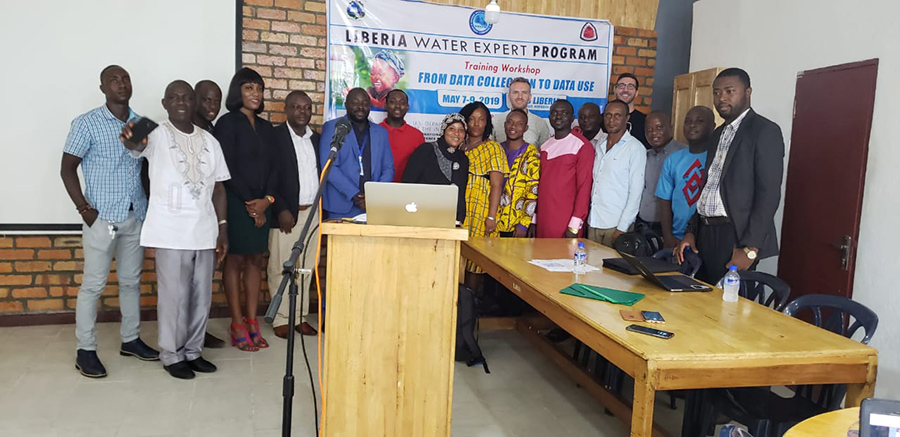
On May 7-9, 2019, WPDx collaborated with Liberia’s National WASH Commission and the United States Water Partnership to provide a three day training to officials from the Government of Liberia and local NGOs on how to accelerate progress towards the Sustainable Development Goals by using data. The training was a success, with nearly 20 participants joining for the three day training.
The first day of the workshop explored the national data landscape, including past national data collection exercises and NGO approaches to data collection. Building on this, the participants developed Liberia’s first ever national water point data exchange framework, based on the WPDx data exchange standard. The day concluded with all participants standardizing and uploading data. The second day focused on using the growing set of data available on WPDx, including training on four powerful analytical tools. These tools, developed by WPDx in partnership with leading data science companies such as DataRobot and ESRI, enable governments to improve the decisions they make on a regular basis. Even with limited internet bandwidth and no experience with data analysis, participants were able to scientifically determine which non-functional water points could reach the most people if rehabilitated, where water points could be constructed to have the greatest possible impact, estimate the number of people in each district with access to basic water services, and even use machine learning to predict which water pionts were most likely to break. On the final day of the training, participants began exploring how this information could help to improve water services in Liberia, throughout both planning and implmentation. The data about new construction and high-impact repairs was used to determine which approach was most cost effective in each case. The participants also developed short term and long term action plans to increase the use of data in the delivery of water services.
As a result of the training, the National WASH Commission determined that they would begin setting up a National WASH Data Management Team. In the month since the training, the WASH Commission has been busy! Three interim data leads, from the WASH Commission and the Ministry of Public Works have been appointed and have begun using the new data standard to harmonize data from across different national Ministries for the first time ever. Moving forward, they will begin engaging NGO partners around increasing data sharing and then lead the effort to roll out the use of this data to improve routine decisions.
As the first formal WPDx training, the training was a massive success. A replicable training module was developed, and the feedback was overwhelmingly positive. Based on the feedback survey:
- Stakeholders clearly see the benefit. The CEO of the national WASH commission said that WPDx would, “help government in budget allotment, service delivery and distribution”. One of the NGOs noted “With WPDx, I can now predict and calculate the probable cost for the rehabilitation and construction of new wells. Unlike earlier, I we already have entered the community before discovering the existing wells.” Participants roundly felt that WPDx could help to accelerate the SDGs in Liberia.
- Stakeholders feel that it is practical and useful. Fully 81% of participants said they expect to use the tools at least monthly.
- The tools are accessible. Despite noting slow internet, the tools were scored an average of 2.3 on a scale of 1 (easy to use) to 5 (hard to use). There’s definitely room to make things easier, but it is exciting that this diversity of particpants found that benefitting from GIS analytics and machine learning was somewhat easy.
- Participants overwhelmingly trusted the results. Across the tools, after understanding the data sources and methodology they trusted the results of the analytics 3.6 on a scale of 1 (no trust) to 5 (full trust).
- There are some really interesting unexpected use cases. The Ministry of health noted that WPDx, “can help me accurately map were functional water points are during events of flooding. Such data is very used when chlorination is needed.” These types of unexpected use cases continue to emerge.
We will share additional updates from the ongoing activities in Liberia as the work progresses. You can read additional coverage of the training from the U.S. Water Partnership here.
